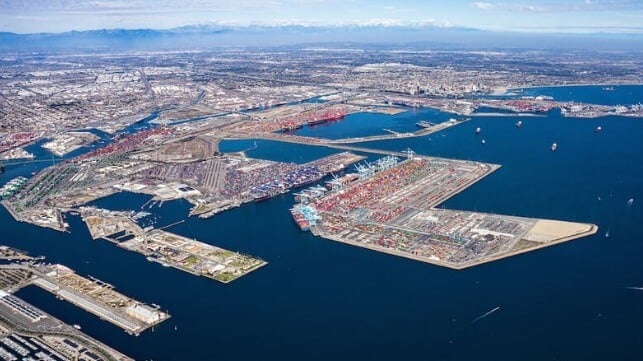Chamber of Commerce Calls for Mediator as Delays Persist at Some Ports

The U.S. Chamber of Commerce became the latest organization to call for intervention to resolve the disruptions at the U.S. West Coast ports. Citing the “familiar pattern of negotiations” and the potential for significant impact on the economy, the largest trade group in the United States wrote to President Joe Biden using the administration to appoint an independent mediator to help the parties reach an agreement.
The Chamber released a copy of the letter sent to President Biden and Acting Labor Secretary Julie Su on Friday morning. This came as reports indicated that ships are again moving along the West Coast and port executives continue to say their ports are open and functioning despite the ongoing “no show” status among some ILWU members.
“The U.S. Chamber of Commerce is very concerned by the premeditated and disruptive service actions that are slowing operations at several major ports along the West Coast,” writes Suzanne Clark, President and CEO of the U.S. Chamber of Commerce. “The best outcome is an agreement reached voluntarily by the negotiating parties. But we are concerned the current sticking point – an impasse over wages and benefits – will not be resolved.”
The letter cites media reports that the International Longshore and Warehouse Union is seeking a doubling of wages over the life of the contract. Some reports are citing the PMA saying that full-time registered longshore workers earned an average of nearly $200,0000, not including benefits, in 2022. In its letter, the Chamber also cites reports that the negotiations over pay and other benefits are at a standstill.
They cite the history of labor disruptions at the ports over the last 20 years related to the contract negotiations. The Chamber writes that “a familiar pattern of negotiations,” is appearing saying that in each case service disruptions began gradually and then escalated. They cite an 11-day shutdown on the West Coast in 2002, three weeks in 2008, and disruptions in 2014.
“A serious work stoppage at the ports of Los Angeles and Long Beach would likely cost the U.S. economy nearly half a billion dollars a day – and a more widespread strike along the West Coast could cost approximately $1 billion per day, using the cost estimates of the Bush Administration in 2002,” the Chamber cautions in the letter. “With continued and potentially expanded service disruptions at these ports heading into peak shipping season, we urge your Administration to intervene immediately and appoint an independent mediator,” Clark writes to the President and Labor Secretary.
Shippers continue to look for signs of backlogs and ship delays. Yesterday, the Marine Exchange of Southern California said “Basically every container vessel is having their schedule pushed back by about a day or two,” citing reports of a shortage of lashers to handle the boxes. Captain Kip Louttit of the Marine Exchange late on Friday said after ranging from 14 to 28 container ships anticipated to be delayed earlier in the week to only three ships were anticipated to be delayed as of noon Friday, and none of these three is delayed more than 14.5 hours.
The analysts at Gatehouse Satcom, however, noted that vessels appeared to begin moving again last night. They noted that the number of ships in Los Angeles dropped from a peak of 20 to 12, and at Long Beach it went from a peak of 13 to 9 ships.
“We’re not sure if it is a sign of whether it is getting worse or better that the ships are leaving the ports,” said Gatehouse Satcom CEO Ulrik Rasmussen. They noted that dwell time had been up in all the ports, but that containers appear to be moving again. Delays appear to be persisting at the Port of Oakland, which was one of the ones most impacted by the labor shortage. MarineTraffic earlier in the week noted that the number of containers waiting offshore at the Port of Oakland spiked from 9,514 to 21,838 TEU.
The Port of Los Angeles shows that four ships were due to arrive today, one from the anchorage. Next week is booked to show an increase in volume with 22 ships scheduled with 110,435 TEU. That is up from the 100,203 TEU booked this week.
The Pacific Maritime Association representing the terminal operators said late on Friday that, "After a series of coordinated and disruptive work actions led by the ILWU at the West Coast’s largest ports between June 2 and June 7, operations have generally improved at the Ports of Los Angeles, Long Beach, and Oakland. However, the Ports of Seattle and Tacoma continue to suffer significant slowdowns as a result of targeted ILWU work actions."

that matters most
Get the latest maritime news delivered to your inbox daily.
With the talks dragging on into their thirteenth month, Mirko Woitzik, Global Director of Intelligence Solutions at Everstream Analytics, notes there have been sporadic issues. “Since the official start of dockworker negotiations in May 2022, ports at the U.S. West Coast have seen disruptions on as many as 30 days in total that were caused by labor actions,” he reports. The Port of Oakland he says has seen a total of 15 days of disruptions, while the Port of Los Angeles experienced 11 days of labor-induced impacts on port operations.
The U.S. Chamber in its letter calling for the appointment of a mediator concludes, “This step is necessary to avoid potentially billions of dollars in economic damage to the American economy before it occurs.”
